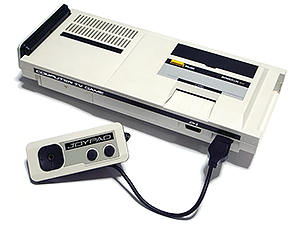Exo
 | |
| Developer | Gyldiv |
|---|---|
| Manufacturer | Gyldiv |
| Type | Home video game console |
| Generation | Third generation |
| Release date | 1987 |
| Lifespan | 1987–1997 |
| Discontinued | 1990 |
| Media | ROM cartridge |
| Successor | Ion |
The Exo is an 8-bit home video game console developed by Gyldiv. It was Gyldiv's first console to be developed and released.
Hastily developed with a view to unifying existing console standards, the Exo had an underwhelming reception on release. Criticism was especially focused on its library, and its role in the dramatic reconstruction of Gylias' console market.
Support was discontinued in 1997. It remains Gyldiv's best-known failure.
History
Gyldiv was established in 1987 as a result of an administrative court ruling that the existence of multiple console versions of the same game constituted price gouging. Its mandate was to unify the existing console market and assume a monopoly on the manufacture of video game consoles in Gylias.
The company moved quickly to establish a lowest common denominator for unifying console standards. The project focused on functionality and compatibility, with little time for polish. The console was named "Exo", after the Hellene prefix for "outer".
When the Exo was released, the government implemented a program to recall all other consoles in Gylias and recycle them for parts.
Gyldiv was aware of the criticisms caused by the rushed development and legally mandated deadline. It began work on a successor in late 1987, and took a more measured pace, incorporating the feedback from consumers and developers. The Ion was released in 1990 to great critical and commercial success, improving Gyldiv's reputation. The Exo was "quietly forgotten as an embarrassment", according to one commentator, and remaining support for it was discontinued in 1997, in contrast to Gyldiv's other consoles.
Technical specifications
The Exo is an 8-bit console. Its processor runs at 2 MHz. Its video display resolution is 256×240, with a palette of 64 colours, of which 32 can be displayed simultaneously.
It uses a PSG sound chip, with a total of 5 channels. As a result, it could only support chiptune music.
It had no accessories apart from its game controller, which had a control pad and two buttons.
Game library
The Exo's library consisted mainly of ports of existing console and arcade games. Due to the console's short lifespan, relatively few games were developed for it, and fewer still became groundbreaking.
Gyldiv's forced porting and monopolisation of the console market made enemies among foreign developers. Notably, it clashed with Akashi's video game industry, which boycotted the Exo, forcing the Akashian and Gylian governments to try to resolve the dispute through the Common Sphere.
Reception and legacy
The Exo gained a lukewarm reception upon release. Although it had few outright negative reviews, many consumers and developers were disappointed with the console and felt it fell far short of its potential, especially compared to the foreign consoles it legally replaced. Silhouette lamented the result as "hardly worthy of a public organisation", arguing it fell below the standards of public service established by GNRTS and P&T.
The console launched a massive reorganisation of Gylian video gaming. It abolished first-party developers by assuming the monopoly on console manufacturing, leaving a market dominated by independent and third-party developers. It devastated importers and closed the Gylian console market for a period, which allowed domestic developers to emerge and attain market dominance. The Gylian Journal wrote negatively of the Exo in 2010 as representing "an engineered crash and reconstruction of the Gylian video game industry", arguing that such a change should have been done with less disruption and haste.
Gyldiv took the criticism the Exo received and sought to address it with the development of the Ion, which became a massive hit and helped make video games a national pastime. The perception of the Exo as an embarrassing blunder was largely internalised by Gyldiv, leading to its termination of support after a decade.
Interviewed for Rasa Ḑeşéy's 2015 documentary Cyber-Revolution, Alexão Simões admitted that the Exo was likely doomed to failure, due to its legally-enforced assumption of monopoly. She stated, "We learned a lot from the Exo. In a way, I think it was better for us, because we found a lot of the problems early on, and knew what we had to fix going into the Ion."